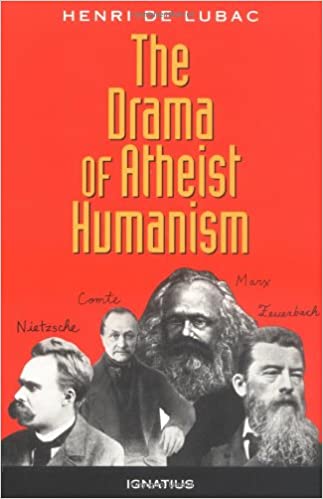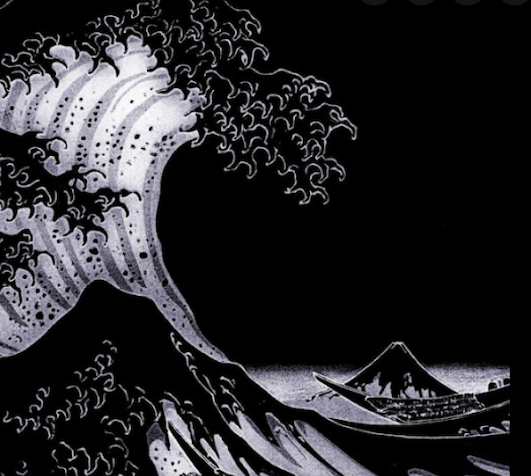The Atheistic Destruction of Man - "The Dissolution of Man" - The Drama of Atheist Humanism - Henri De Lubac
The Dissolution of Man from the Drama of Atheist Humanism by Henri De Lubac SJ
Henri De Lubac was a Catholic priest and Jesuit scholar in the 20th Century. He was influential in the Church's thinking during and after the Second Vatican Council. He also was a brilliant philosopher in his own right, and in this work you can see how widely read and knowledgeable he is. I encourage everyone to pick up this book!
In this particular chapter he shows that reality of what a humanity cut off from its roots in God inevitably must look like. It is the return of human beings back to the animal kingdom, back to the survival of the fittest, back to "might makes right." Now there are those who wish to obscure the true conclusions of atheism, trying to make it more palatable or to tame it, but De Lubac points out that this is to be inconsistent with one's own philosophy and view of the world. The founders of modern atheism would not want such a taming to take place, rather they expressly desired the complete upheaval of Christian society ... something we should all pray never takes place again since its first manifestation in the 20th Century.
The Death of God
In this section of chapter 1 De Lubac lays out the claim that the 19th Century atheists held that for man to fully realize himself, and throw off his previous "alienation," that they must just not reject God's existence, but they must prevent even the question of God from arising in man's mind. 1 If man believes in God then he will always fall back into putting what is best in himself into God. Man will take all of the moral goodness that is in himself and attribute it to a false being. This will also limit man ethically by the boundaries of the desires of such a being, having him focus on Heaven instead of earth. Like the Greek Prometheus, who stole from the gods for humanity, so too must man now steal back from God what was really his all along. 2
De Lubac also points out a methodological shift from the generation of Hegel and Feuerbach to that of Marx and Engels. Hegel and Feuerbach represented the last of the theoretical, while those following, like Marx, desired to finish with the theoretical and to take action. 3 "...Marx was to proclaim in the sixth of his Theses on Feuerbach the interdependence between man's spiritual alienation and his temporal an social alienation - that is to say, what he had lost to God through religion and what he had lost to other men through their exploitation of him. Refusing to 'crouch' any longer 'in the speculative concept', he declared that 'the driving force of history is not criticism but revolution' and finally, in the last of these Theses, uttered the famous watchword: 'So far the philosophers have done nothing but explain the world; now we have got to transform it.'" 4
The Destruction of Objectivity
This action must take the form of removing religion completely from society. According to Nietzsche, even the idea of "truth," as such is a shadow of the former existence of God... actually even the idea of "falsehood" is a shadow of God. Any notion of objective reality is to reflect God's former existence. 5 "There was to be no more contemplation of the real in order to discover its essence, no more submission to any object whatsoever." 6 There can be no essence to things, and thus no objective value in them either. The role of the new man is to create these realities for himself, according to Nietzsche. 7 From another philosopher of the time, Max Stirner, ... "The ancient Apollonian inscription 'Know thyself' is no longer engraved over the threshold of our epoch, but this new inscription: Make the most of yourself, Verwerte Dich!" 8
The idea of essences and values are things that have to be recreated over and over again according to the powerful of the age. The new philosopher is not someone who deals in theories and books, but someone who dictates the new rules of civilization. Like Marx, in a revolutionary manner. Now, Nietzsche understood that the "death of God," of the theistic worldview, and replacement with new man-made and arbitrary values would lead to a time of chaos and upheaval. 9 "I herald the coming of a tragic era ... We must be prepared for a long succession of demolitions, devastations, and upheavals ... there will be wars such as the world has never yet seen ... Europe will soon be enveloped in darkness ... we shall watch the rising of a black tide ... Our whole European civilization is in a state of anguished anticipation; it is making its way, decade by decade, toward catastrophe with a restless, irresistible movement, increasingly hastened by a river that runs to its end, that no longer reflects, that would be afraid to reflect." 10
The Nature of Man
What, in reality, does this mean for mankind, or the individual dignity of a man? Well, in reality it means that there is no such thing as a man. There is no essence which makes him up. There is no higher being which gives him dignity and a purpose. There is no values inherent in his heart to guide him properly in his actions with others. 11 Rather, man is "... a thing that has no content, a cell completely merged in a mass that is in process of becoming ... There is nothing to prevent his being used as a material or as a tool either for the preparation of some future society or for ensuring, here and now, the dominance of one privileged group. There is not even anything to prevent his being cast aside as useless." 12 De Lubac points out that such a radical conclusion is not an extreme interpretation. Those who come after these figures and seek to tame them or interpret them in some more civilized way are not doing justice to these philosophers. Nietzsche and Marx would themselves condemn such an attempt at rehabilitation. 13
To strip the divine from the realm of human beings may seem like a freedom at first, but in reality it is only this realm which allows man to live together in love with others, to flourish, to have civilization, to be fully human in the best sense. 14 "God is the Absolute upon which he rests, the Magnet that draws him, the Beyond that calls him, the Eternal that provides him with the only atmosphere in which he can breathe and, in some sort, that third dimension in which man finds his depth." 15 In "destroying" God he has ended up destroying everything that made man dignified over the animals. He soon realizes that he is simply part of the inevitable forces of nature. 16 And what is the law of nature? Death. Natural selection works by things dying. Man, as an individual, is simply a "'being made for death.'" 17 De Lubac provides a quote from Thus Spake Zarathustra, "Oh, Earth ahead of us! Earth of deliverance and fellowship! Earth promised to our Promethean exertions! This is what your beauty means to us now: that there is no heaven above you to keep us under the yoke, no everlasting precept to clip our wings! But that a day will dawn over you, a day of reconciliation, marking the end of history, in which man and Nature will celebrate their espousals!" 18 In freeing himself from God, he has simply made man a slave of nature, a more base and arbitrary master.
There are those, De Lubac says, that have tried to promote a type of atheism which is not so radical, one which preserves many Christian ideals but without the Christian part. For example, the notions of freedom, truth, justice, universal brotherhood, etc. But how can a plant which is cut off from its roots continue to bear fruit? How can it do anything but die, having no nourishment? Atheism, if it is intellectually true, has no place to end up but in the extremes of these 19th Century Atheist Humanists. To tame it, to make it nice, to "Christianize" it, is not coherent. 19 "Without God, even truth is an idol, even justice is an idol. Idols too pure and pale in face of the flesh-and-blood idols that are regaining their pedestals..." 20
Now De Lubac does admit that Christians have often failed at fully living out their faith, personally and as a Church, giving excuse for criticism from the outside. But he does not go so far to agree with them that the whole thing can therefore be thrown away. 21 But that is exactly what Atheist Humanism does. While there are those who dissociate themselves with its true consequences, there is always a threat that its true import will be reinvigorated, as it was in the early 20th Century. De Lubac concludes this chapter by asking which way man will go. Will he return to the utter state of nature and survival of the fittest, barbarism ... or will he return to God and rediscover his faith? 22
-----------------
1 - De Lubac, Henri. The Drama of Atheist Humanism. Ignatius Press. San Francisco. (1995) Pg. 58
2 - 59
3 - 60
4 - 61
5 - 62
6 - 62
7 - 63
8 - 63 (footnote)
9 - 64
10 - 64, 65 (footnote)
11 - 66
12 - 66
13 - 66
14 - 67
15 - 67
16 - 68
17 - 69
18 - 69
19 - 70
20 - 71
21 - 71
22 - 72






Comments
Post a Comment